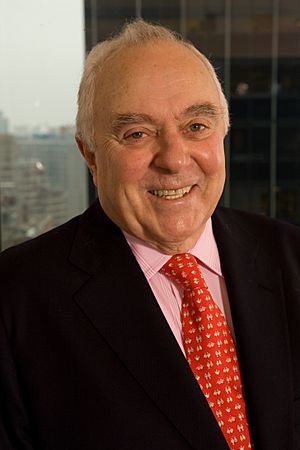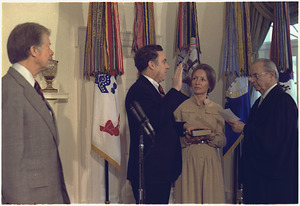Joseph A. Califano Jr. facts for kids
Quick facts for kids
Joe Califano
|
|
|---|---|

Califano in 2008
|
|
| 12th United States Secretary of Health, Education, and Welfare | |
| In office January 25, 1977 – August 3, 1979 |
|
| President | Jimmy Carter |
| Preceded by | F. David Mathews |
| Succeeded by | Patricia Roberts Harris |
| White House Domestic Affairs Advisor | |
| In office July 26, 1965 – January 20, 1969 |
|
| President | Lyndon B. Johnson |
| Preceded by | Position established |
| Succeeded by | Pat Moynihan (Urban Affairs) |
| Personal details | |
| Born |
Joseph Anthony Califano Jr.
May 15, 1931 Brooklyn, New York City, U.S. |
| Political party | Democratic |
| Spouse |
Hilary Byers
(m. 1983) |
| Children | 5 |
| Education | College of the Holy Cross (BA) Harvard University (LLB) |
| Military service | |
| Allegiance | United States |
| Branch/service | United States Navy |
| Years of service | 1955–1958 |
| Rank | Lieutenant |
Joseph Anthony Califano Jr. (born May 15, 1931) is an American lawyer who has had a long career working for the United States government. He is best known for helping to create important government programs under Presidents Lyndon B. Johnson and Jimmy Carter.
During the Carter administration, he served as the United States Secretary of Health, Education, and Welfare. In this role, he was in charge of the nation's health, schooling, and social programs. He has also been a professor of public health at Columbia University Medical School.
Contents
Early Life and Schooling
Joseph Califano was born in Brooklyn, New York, on May 15, 1931. He grew up in Brooklyn and went to St. Gregory's Elementary School and Brooklyn Preparatory School.
After high school, he went to the College of the Holy Cross in Massachusetts, where he earned a Bachelor of Arts degree in 1952. He then studied law at the famous Harvard Law School and graduated in 1955. While at Harvard, he was an editor of the Harvard Law Review, a very important student-run law journal.
Career Beginnings
After law school, Califano joined the United States Navy in 1955. He served for three years as a lawyer in the Navy's Judge Advocate General's Corps, which handles all legal matters for the Navy. He left active duty in 1958 with the rank of lieutenant.
In 1961, he began working for the U. S. Department of Defense. He quickly moved up and became the Special Assistant to the United States Secretary of the Army in 1962. A year later, he was appointed General Counsel of the Army, making him the top lawyer for the entire U.S. Army.
Working in the Department of Defense
As the Army's top lawyer, Califano had many important jobs. He advised the U.S. during an investigation into riots in Panama in 1964. For his excellent work, he received the Distinguished Civilian Service Medal, the highest honor the Army can give to a non-military person.
In 1964, he was promoted again to Special Assistant to the Secretary and Deputy Secretary of Defense. In this role, he worked closely with the White House. In 1965, he was given the important task of monitoring the historic Selma to Montgomery marches. These peaceful protests were a key moment in the civil rights movement and helped lead to the Voting Rights Act of 1965.
Working for President Johnson
On July 26, 1965, President Lyndon B. Johnson (often called LBJ) appointed Califano as his Special Assistant. This made Califano the president's main advisor on all issues inside the country. He helped create the president's plans for new laws, managed economic policies, and dealt with national problems.
He worked on many different issues, including:
- Helping workers and companies get along
- Improving healthcare and education
- Protecting the environment
- Solving problems in big cities
- Fighting for civil rights
He was so important to President Johnson that The New York Times newspaper called him "The Deputy President for Domestic Affairs." He stayed in this job until Johnson's presidency ended in January 1969.
Secretary of Health, Education, and Welfare
After working as a lawyer for several years, Califano returned to government in 1977. President Jimmy Carter appointed him as the Secretary of Health, Education, and Welfare (HEW). This department was in charge of some of the biggest government programs.
As Secretary, Califano made many changes. He created the Health Care Financing Administration (HCFA) to manage Medicare and Medicaid, which provide health insurance for older Americans and people with low incomes. He also started major health campaigns, such as a program for childhood immunizations and the first national anti-smoking campaign.
Fighting for Equal Rights
Califano also worked to make sure all people were treated fairly. He issued the first rules for Title IX, a law that gives women equal opportunities in sports at schools and colleges.
He also played a key role in protecting the rights of people with disabilities. At first, he did not sign rules for Section 504 of the Rehabilitation Act of 1973, an important civil rights law for disabled people. This led to protests across the country. The most famous was the 504 Sit-in in San Francisco, where over 150 people with disabilities occupied a federal building for 25 days. Because of these protests, Califano signed the new regulations on April 28, 1977.
Leaving the Cabinet
Despite his successes, Califano often disagreed with President Carter. Califano's plans required more government spending, but Carter wanted to reduce the national budget. They also disagreed on creating a separate Department of Education. Califano thought education programs were safer inside the large HEW department. Because of these disagreements, President Carter asked Califano to leave his position in July 1979.
Life After Government Service
After leaving the Carter administration, Califano returned to practicing law. From 1983 to 1992, he was a senior partner at the law firm Dewey Ballantine LLP in Washington, D.C.
He has served on the boards of many important organizations, including CBS Corporation, the New York-Presbyterian Hospital, the LBJ Foundation, and the John F. Kennedy Center for the Performing Arts. He is also a member of the Council on Foreign Relations, a group that studies world issues.
Books
Califano has written fourteen books on government, politics, and health. Some of his most well-known books include:
- Our Damaged Democracy (2018)
- Inside: A Public and Private Life (2004)
- The Triumph and Tragedy of Lyndon Johnson: The White House Years (1991)
- Governing America: An Insider's Report from the White House and the Cabinet (1981)
- A Presidential Nation (1975)
- The Student Revolution: A Global Confrontation (1969)
 | Selma Burke |
 | Pauline Powell Burns |
 | Frederick J. Brown |
 | Robert Blackburn |


